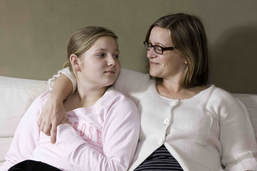|
by Jessica Cleary, Psychologist As a parent you have the opportunity to be your child's most influential educator in regards to all things sexuality and reproductive health. The problem is, many parents feel awkward about having these conversations and are not really sure how to begin. So some parents don't go there at all to avoid the discomfort. If you avoid teaching your child about sexuality then you run the risk of someone else doing it for you. Sex ed programs in schools can teach some information, but the other biggest influencer these days is what kids read and see on the internet. With the average age of first exposure to pornography around 11 years (with some researchers stating it is as young as 8), we need to be proactive in educating our children. If we don't then children and teens might learn that the violence and unrealistic behaviour demonstrated in readily accessible mainstream pornography is normal sexual behaviour. So, let's go back to the beginning... Name it, don't shame it! Cutesy body part nicknames instead of scientific terms are really not appropriate if we want to empower our children to have positive body image. If it is difficult for you to use anatomically correct words to describe genitals, think about why that is. Did you inherit this discomfort from your own parents? We don't want our children to feel that there is anything shameful about their bodies. By encouraging the use of correct body part names we send the message that their body is normal - whether that body part be a shoulder, penis, liver, clitoris, scrotum or knee. It's body science! When we don't use the name of certain body parts we send the message that those words are not to be spoken. This can lead to children feeling shame about their bodies and can discourage children asking questions about sexual development and seeking help when needed. Instead they might look to the internet to get their answers. Additionally, if something of concern were to happen to a child regarding inappropriate touch, then it's harder for the child to communicate this to a trusted adult in a way that is understood.. "He touched my noodle" isn't going to get the same attention as "he touched my penis". Getting your vaginas confused with your vulvas? It doesn't help that many of us adults haven't been taught anatomically correct terms for our reproductive and sexual anatomy. Unfortunately, it's pretty common for girls in particular to not know the correct names of their body parts. Knowing the accurate names helps in a medical situation or in abuse situations. (FYI: the vulva is the external female genital organs and the vagina is the internal organ connecting the genital organs to the uterus). It's never too early to have THE talk... Actually, you never have to have THE talk. Instead, speak early and speak often about all parts of the body and all things sexuality as they come up. The more you talk about the body the easier it will be for both of you. And when the more curly questions start rolling in you can continue the conversation in age appropriate terms. If your child isn't asking any questions then take the lead with having resources available for them to look it if they are interested. If you need some age-appropriate ideas then check out these reading materials. If you're taken off-guard with a particularly tricky question, say "That's a very interesting and important question. Let me have a think about it and I'll answer it for you tonight". Make sure you do address it! Don't chicken out. ...but it's also never too late to start the conversation If you have older kids and are worried because you have never talked to them about sex stuff, then be assured that it's never too late. Strike up a conversation and admit: "You know, I realise that I should have started talking to you about relationships and sex earlier than now, but I would really like to change that." Let them know that you want to be there to answer questions and to help problem solve when issues arise.  Is your embarrassment getting the better of you? You've gotta just rip that bandaid off and do it! You might feel uncomfortable at first but this feeling will pass, especially when your children just take the information in their stride, as kids generally do. If you have young children then nappy changes or bath time are ideal opportunities to name genitals just as you do other body parts. After you do it a few times your discomfort will subside. Looking through books on the reproductive system with your primary school aged child sends the message that you are the go-to person when they have questions and are curious about something to do with sex. Don't make a big deal about it, answer questions in a casual way, and have books on the reproductive system accessible just like you do with other science books on astronomy and the environment. If you are really struggling, just be honest. Start with "I feel a bit embarrassed talking about this because my parents and I never spoke about these things when I was growing up. But I think it's really important for you to know so I'll give it my best shot." Tell them that "You can always ask me any question you have and I'll do my best to answer it." It's up to us parents to manage the discomfort that we might have around sexuality and the body so we can be the primary source of information for our kids. A child's questions are often simple and not sexual and deserve to be met with positivity, openness, and accuracy. You've got this!
Comments are closed.
|
Categories
All
|
Hopscotch & HarmonyAt Hopscotch & Harmony Psychology, you can expect compassionate care and evidence-based guidance on your journey to wellness.
With clinics in Werribee and Belmont, as well as providing online counselling to clients who live throughout Australia, our dedicated team of psychologists and dietitians are committed to providing support to children, teenagers and adults. With a focus on understanding your unique needs, we offer tailored solutions to foster growth and resilience. Trust in our experience and dedication as we work together towards your well-being. Welcome to a place where healing begins and possibilities abound. |
Our services |
Contact usHopscotch & Harmony
Child, Teen and Adult Psychology Our Locations:
WERRIBEE: 1/167-179 Shaws Rd
BELMONT: 92 Roslyn Rd AUSTRALIA-WIDE: Online counselling |
Hopscotch and Harmony respectfully recognise the Aboriginal and Torres Strait Islander people as the first Peoples of the continent now called Australia.
We acknowledge the Bunurong and Wadawurrung people of the Kulin Nation, the traditional owners of the land on which we work, and pay our respects to their Elders, past, present and emerging.
© 2024 Hopscotch and Harmony Pty Ltd



 RSS Feed
RSS Feed
